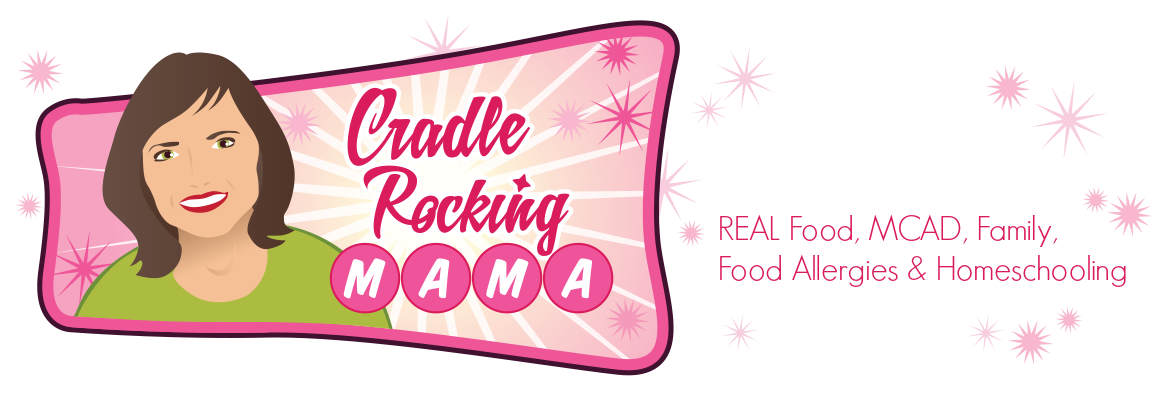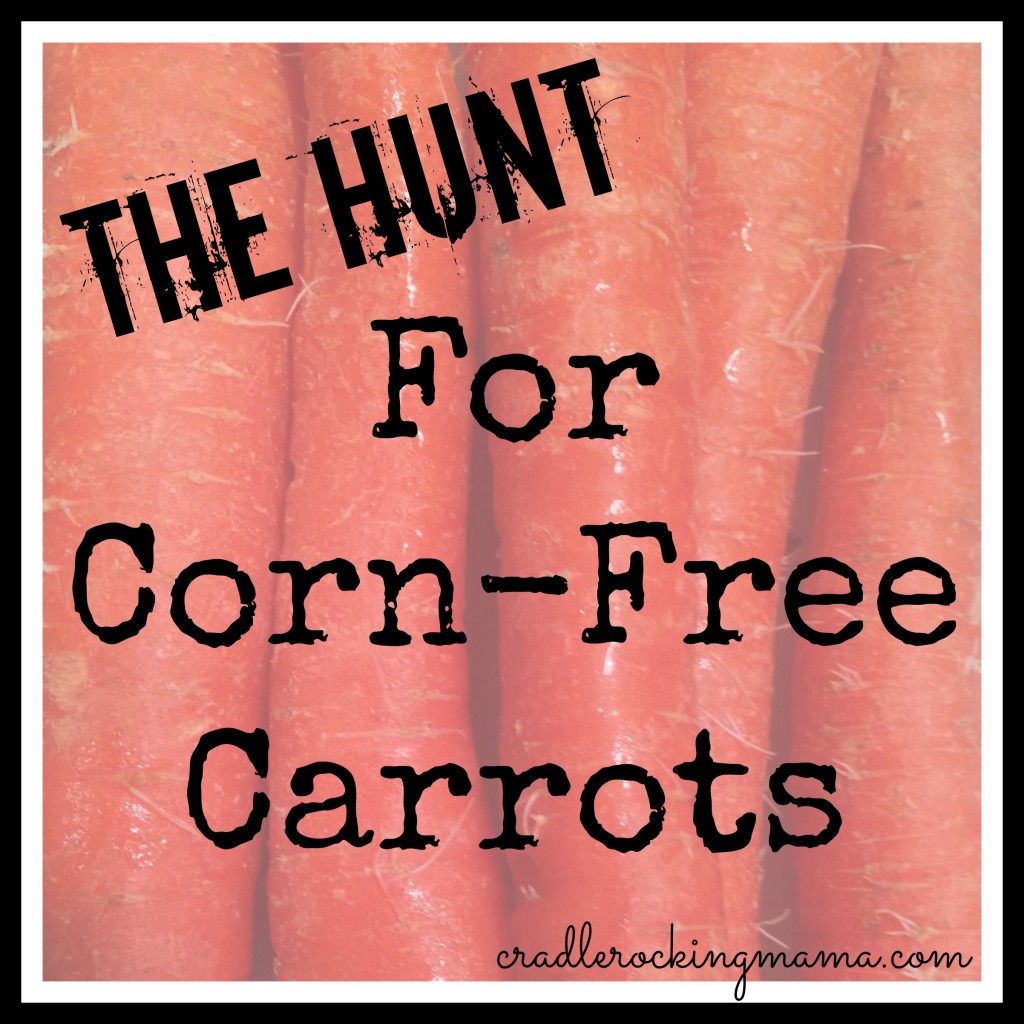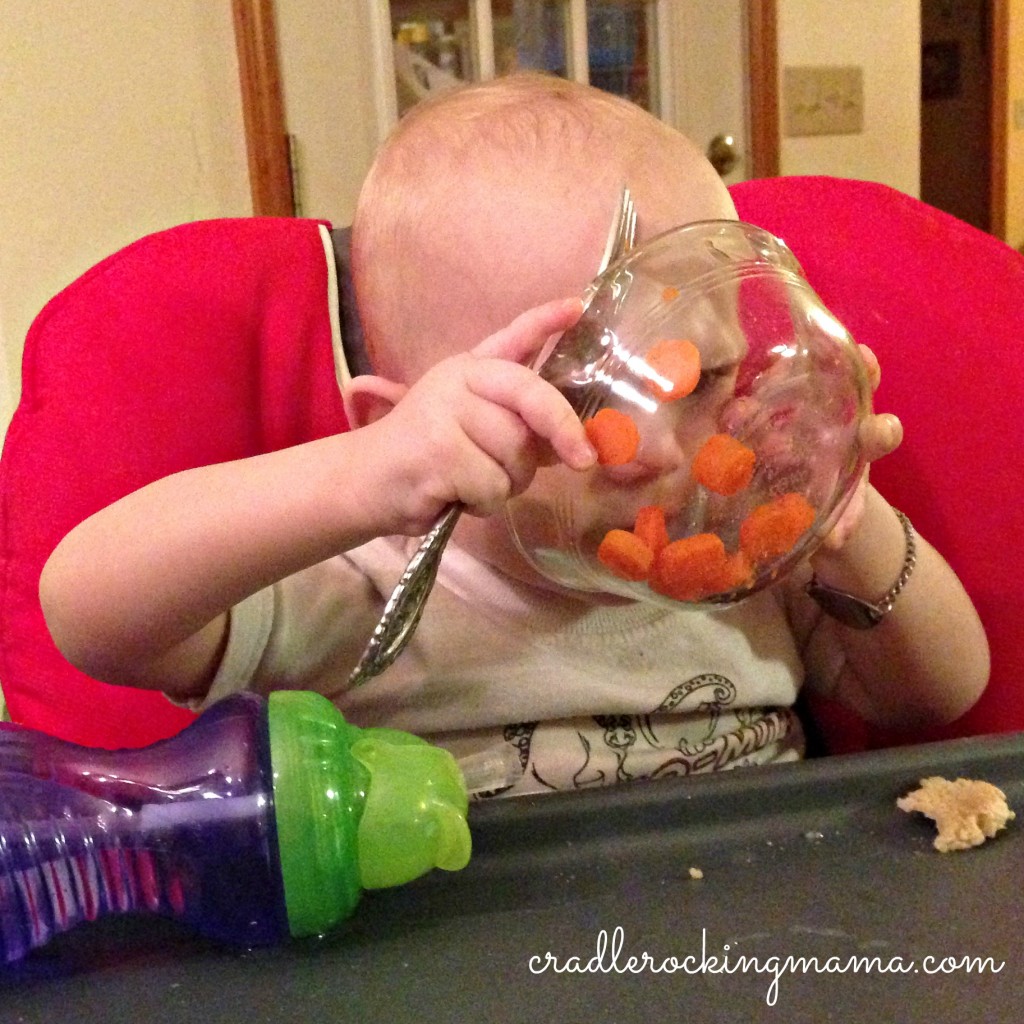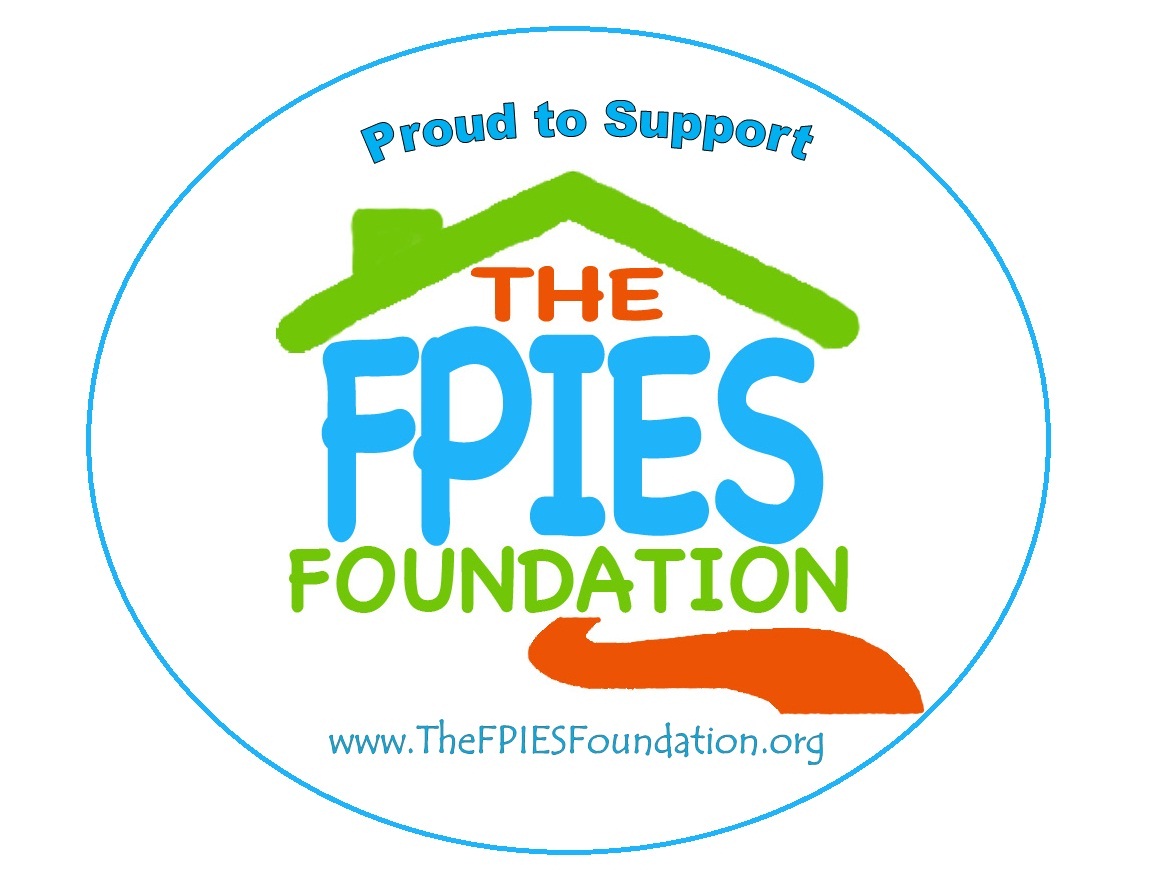I’ve become a hunter.
A vegetable hunter, that is.
I’m on the hunt for a corn-free veggie to trial for Zac.
Broccoli was a no-go, and we think it was because of some corny substance on the broccoli. Swiss chard was a no-go, and we aren’t sure if that was an FPIES reaction, difficulty digesting the chard because it was too much for his intestines to handle, or a combination of both.
So we’re trying to avoid leafy greens and other veggies that might be rough on the digestive tract.
And, as always, we’re trying to avoid corn.
My Mom came up with a suggestion during a food-trial brain-storming phone call: why not trial carrots on him? I’d eaten them for months during my TED with no discernible reactions from Zac, so maybe that was a good place to start. Plus, she remembers the “first baby foods” she fed me, and carrots were an early food; one recommended for immature digestive tracts.
Sounds good to me!
Now I just have to find corn-free carrots.
Easier said than done, y’all.
To start with, I looked online for local farmers who grow organic carrots. This time, unfortunately, I found nothing.
Then I called my health food co-op to ask what producers of carrots they currently have available. No need to research things that aren’t available to me, after all.
I have two choices right now: Earthbound Farms or Bunny-Luv. Earthbound Farms is available to me in bagged carrot form, or in bunches. Bunny-Luv is only available in bagged carrot form.
OK. So, armed with my handy-dandy list of questions, I called Bunny-Luv.
Bunny-Luv is actually a product of Grimmway Farms. I spoke with their customer representative, Sherilyn, who was very sweet and wanted to help with my research as much as possible. SUCH a nice change!
On to the questions:
1) Were fertilizers used and if so, what type?
Yes, fertilizers were used. No, she could not tell me exactly which ones were used on an particular field of carrots, as each field has different needs at different times and there is no way for her to know with any certainty.
2) Were pesticides used and if so, what type?
Same answer for pesticides/herbicides, except to add that they are certified organic, so no chemicals are used in any way. She also added that if the USDA allows a fertilizer, pesticide or herbicide under the Certified Organic umbrella, there’s a good chance that at some point it will be used on their harvests.
3) What is used to transport the carrots to the facility and is it shared with any other crop harvested (i.e. corn)?
They only handle carrots in the carrot facility; the carrots are transported in boxes on trucks.
4) Is the facility in which it’s processed used only for carrots? If not, what is used to clean the lines between types of food processing?
The facility only processes carrots. No cross-contamination.
5) What are the carrots rinsed with to clean?
They are rinsed with basically tap water. The rinse water has chlorine at 4 ppm, which is in line with what most of us drink in our local tap water.
6) Are the carrots treated with anything to keep it fresh/green/etc.?
No. They use no preservatives of any kind.
7) What are the carrots cooked in/with?
Nothing. They are raw.
8) What is the packaging made of?
The bagged carrots are in bags made of food grade plastic/resin. The bags are in compliance with food grade plastics with no BPA. They are recyclable but not biodegradable.
The bunch carrots are bunched, then placed in craft-style cardboard boxes for shipment.
9) What is the adhesive on the packaging made of?
No adhesive on these packages.
Sounds good, right?
She even called me back without prompting! She called her growers on my behalf and asked, and they contributed this little gem: stay away from their leafy greens, but any of their root vegetables were likely safe from any products that contained corn.
In other words, they spray the heck out of the spinach, kale and whatnot with organic products that contain corn, but don’t often have to do so on anything “root” like carrots or potatos.
Beyond that, in our conversation, she shared that anything washed and ready-to-eat (like leafy greens) was washed in a citric acid solution. (Which I already knew.) She didn’t know, however, if their citric acid was corn derived or not. (Which means it probably is.)
OK! Moving on to Earthbound Farms Organic Carrots, where I spoke with Tish, who was also very helpful and sweet.
Same questions:
1) Were fertilizers used and if so, what type?
Yes, fertilizers were used. No, she could not tell me exactly which ones were used on an particular field of carrots, as each field has different needs at different times and there is no way for her to know with any certainty.
2) Were pesticides used and if so, what type?
Same answer for pesticides/herbicides, except to add that they are certified organic, so no chemicals are used in any way. She also added that if the USDA allows a fertilizer, pesticide or herbicide under the Certified Organic umbrella, there’s a good chance that at some point it will be used on their harvests.
3) What is used to transport the carrots to the facility and is it shared with any other crop harvested (i.e. corn)?
It is possible the carrots are transported with other crops. The carrots are put in plastic, metal or cardboard bins, loaded on to trucks and transported to the facility.
4) Is the facility in which it’s processed used only for carrots? If not, what is used to clean the lines between types of food processing?
The facility only processes carrots. No cross-contamination there.
5) What are the carrots rinsed with to clean?
They are rinsed with basically tap water. The rinse water has chlorine at 4 ppm, which is in line with what most of us drink in our local tap water.
6) Are the carrots treated with anything to keep it fresh/green/etc.?
No. They use no preservatives of any kind.
7) What are the carrots cooked in/with?
Nothing. They are raw.
8) What is the packaging made of?
The bagged carrots are in bags made of No. 4 plastic. No BPA, generally they are low density polyethylene.
The bunch carrots are bunched, then placed in cardboard boxes for shipment. She did not know for a fact, but said the boxes may have a plastic liner.
9) What is the adhesive on the packaging made of?
No adhesive on these packages.
Pretty clear, right?
She also clarified that all washed, ready-to-eat products will be rinsed in a citric acid solution. Because she had recently been asked that question, she knew that at this time, the citric acid Earthbound Farms used is NOT corn-derived.
OK. So. Conclusions?
I have no idea.
I asked on the corn boards, and they answered that all products from these manufacturers are corny; but when I read some archived conversation threads, it seems they were more discussing the leafy greens, rather than the root veggies.
In the end, it came down to a few simple things: we need to proceed with food trials, whatever we trial is going to have some risk, and I should probably avoid anything in the plastic baggies, as those baggies were likely corned in some way.
Process of elimination says – Earthbound Farms bunch carrots it is!
So, we bought some.
Saturday, I cut the tops off, scrubbed them in a baking soda scrub, rinsed them in safe water, peeled them, rinsed them in safe water again, and diced them up for the steamer. When they were done, Zac dined!
And, oh, how he dined!
The kiddo LOVES carrots! Unlike the Swiss chard, carrots had an appeal like broccoli! He screamed for them! He clapped his hands! He kicked his feet! He grinned like a crazy loon!
He scarfed down about a cup of steamed carrots all at one sitting, even after eating 20 quinoa nuggets for dinner!
It was quite amusing, actually; he obviously was full, obviously had no need for any more food…but he kept diligently putting carrots in his mouth and chewing them up despite the fact that he didn’t have room for them. He even screamed in anger when we tried to take them away!
That night, he slept for FOUR AND A HALF HOURS STRAIGHT! That might be a record, y’all.
Sunday was exactly the same (except we fed him carrots first, so he wasn’t stuffing a full belly). He ate carrots at breakfast and at lunch with gusto and glee.
Last night he had an excellent diaper, and again slept well.
It’s too early to call it. Too early, really, to even get our hopes up. But maybe, God willing, we found another safe food for Zac?
Oh, I hope!












